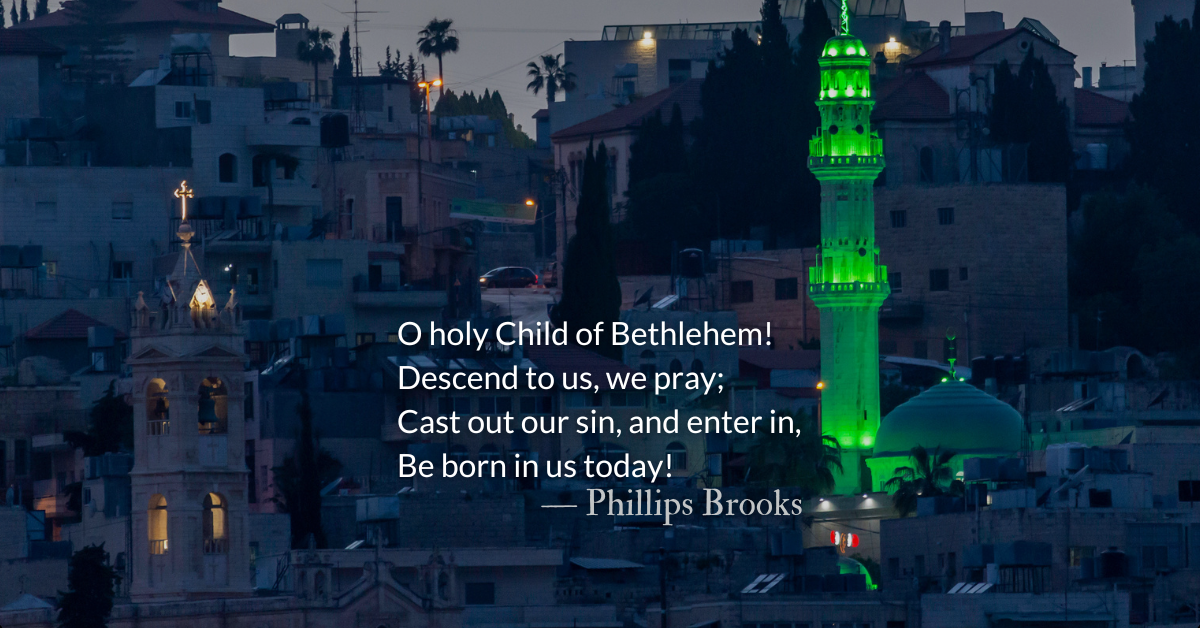Scripture Focus: Psalm 126:1-3
1 When the Lord restored the fortunes of Zion,
we were like those who dreamed.
2 Our mouths were filled with laughter,
our tongues with songs of joy.
Then it was said among the nations,
“The Lord has done great things for them.”
3 The Lord has done great things for us,
and we are filled with joy.
Micah 5:2
2 “But you, Bethlehem Ephrathah,
though you are small among the clans of Judah,
out of you will come for me
one who will be ruler over Israel,
whose origins are from of old,
from ancient times.”
Reflection: O Little Town of Bethlehem — Carols of Advent Joy
By Jon Polk
The endearing carol, O Little Town of Bethlehem, was written in 1868 for the Sunday School children of Philadelphia’s Church of the Holy Trinity. Phillips Brooks, rector of Holy Trinity wrote the lyrics and Lewis H. Redner, church organist, contributed the music.
Phillips Brooks was born in Boston, attended Harvard University, and was ordained an Episcopal priest in 1859. Brooks relocated to Philadelphia where he served as rector for Church of the Advent for three years before moving to Holy Trinity shortly after the start of the American Civil War.
Brooks preached against slavery, ministered to African American troops, and advocated for granting equal rights to freedmen. When the funeral train carrying Abraham Lincoln’s casket stopped in Philadelphia, Brooks was selected to deliver the local eulogy.
Following those tumultuous years, in August 1865, the church sent Brooks abroad for a year where he traveled through Europe and arrived in the Holy Land in December.
After two weeks in Jerusalem, he traveled on horseback out to Bethlehem on Christmas Eve. There Brooks took part in the Christmas Eve service at the ancient basilica built over the traditional location of the Nativity. He was so moved by the experience that he wrote about it to the congregation back in Philadelphia.
I remember especially on Christmas Eve, when I was standing in the old church at Bethlehem, close to the spot where Jesus was born, when the whole church was ringing hour after hour with the splendid hymns of praise to God…
The memory of visiting Bethlehem stayed with him, and three years later, he wrote the lyrics to O Little Town of Bethlehem for the church Christmas service in 1868. You can hear the peaceful tranquility of his experience expressed in the opening stanza.
O little town of Bethlehem,
How still we see thee lie!
Above thy deep and dreamless sleep
The silent stars go by
Brooks gave his lyrics to organist Lewis Redner, asking him to compose a tune. Redner was occupied with preparations for the Christmas service and had not written the tune by Saturday night. Stressed about the performance the next day, he fell asleep, only to be awakened by what he said was an angel whispering the tune in his ear. Redner commented, “Neither Mr. Brooks nor I ever thought the carol or the music to it would live beyond that Christmas of 1868.”
The carol has endured long since then for its sanguine simplicity and because it reminds us of the profound meaning of the birth of a child in the little town of Bethlehem.
O holy Child of Bethlehem!
Descend to us, we pray;
Cast out our sin, and enter in,
Be born in us today!
Listen: Little Town by Amy Grant
Read: Lyrics from Hymnary.org
Divine Hours Prayer: The Request for Presence
Bow your heavens, O Lord, and come down; touch the mountains, and they shall smoke. — Psalm 144.5
– From The Divine Hours: Prayers for Summertime by Phyllis Tickle.
Today’s Readings
2 Chronicles 22-23 (Listen 6:51)
Psalms 126-128 (Listen 1:58)
Read more about Pause To Read
The trailer for our podcast, Pause to Read, is available now and the 1st full episode (approximately 5 minutes) is out Friday. Please subscribe and share the episodes.
Read more about Supporting Our Work
Our ad-free biblical devotional content isn’t free to produce or share with inboxes across the world. Please consider joining our donors.








